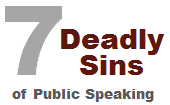
When you think about charisma, who do you think about? Bill Clinton? Martin Luther King Jr.? Steve Jobs?
What about you? Do you have charisma?
Many speakers and non-speakers hold the belief that charisma is an innate gift — either you are born with it, or you aren’t.
But can you learn charisma? Recent research suggests that you can!








































